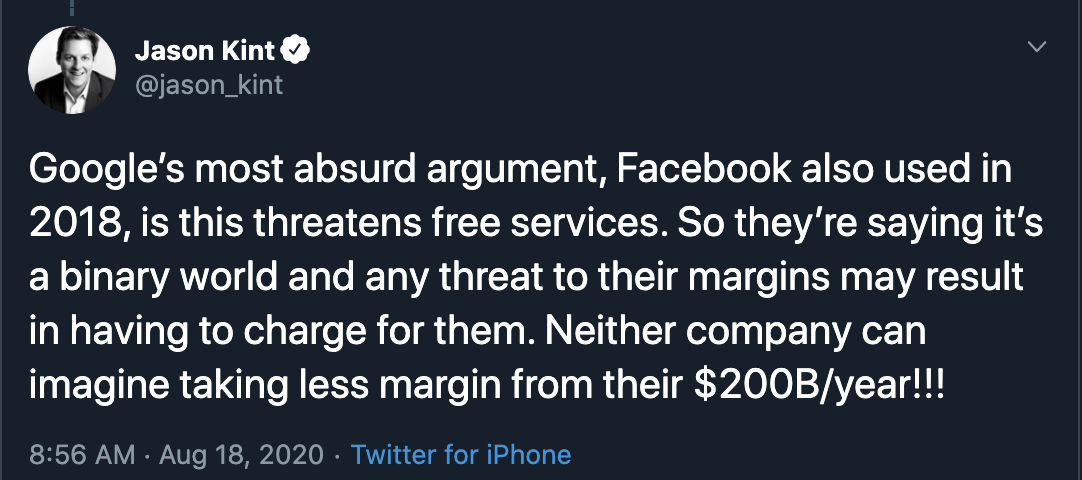 |
||||||||||||
|
||||||||||||
| Pubs Sorely Missing From W3C Conversations |
| Is the future of advertising being shaped by one dominant player? That’s a serious question being raised by a group of ad tech companies, agencies and data providers who shared their concerns with the W3C’s Advisory Board at an August 6 meeting. We recently spoke with one of the presenters at the meeting, James Rosewell, CEO and Co-Founder of mobile data services company, 51Degrees. He then told us about a letter, signed by 19 W3C members, that was sent to the Board asking for intervention because they felt that the voices of members from smaller organizations were not being recognized or taken seriously. In case you didn’t know, the W3C is where alternatives to the third-party tracking cookie are being discussed and tested. As for the players who met with the Board, they’re uneasy about Chrome’s influence in the weekly W3C business group discussions, as well as the absence of Google’s Ads team. While we’re not exactly sure about the outcome of these proceedings, we have it on good faith from AdExchanger that the Board was open to hearing from the group and would likely meet with them again. |
| It’s looking like the W3C’s openness may have resulted in some significant process changes. The one we’re most closely watching says it will ensure that the impacts to a wider set of stakeholders are considered for any new proposed changes to the web. If this is true we’re curious why we haven’t been hearing many publishers’ voices in these proceedings. Is it because pubs aren’t interested in what’s going on at the W3C? That’s highly unlikely, given how directly the expiration of the third-party tracking cookie will impact monetization. It almost feels like the ad tech community is speaking for the entire ad ecosystem—sans publishers. Our natural curiosity about these things led us to craft a session, at our upcoming Publisher Forum Virtual Aug 25-26, W3C and Privacy Sandbox—an Insider Pub Perspective, featuring Paul Bannister, Chief Strategy Officer, CafeMedia; Joey Trotz, Global Head of Advertising Technology, IBM Watson Advertising; Jeff Burkett, VP Product - Display Media, Gannett; and Robert Blanck, General Manager Advertising & Ecommerce, Axel Springer discussing what’s really going on in the W3C group meetings while explaining the challenges and opportunities with the W3C processes and why it’s imperative that pubs participate. |
| Google Threatens Free Services in Australia |

Image sourced from Twitter
|
| Google doesn’t want to pay Australian media outlets to have their news stories appear on any of the tech giant’s properties. As TechCrunch reports, the tech giant has gone as far as scaring Australian users—with a popup on their homepage—into believing that the regulations the Australian government seeks to impose upon companies like Google and Facebook would favor big media, making the Google and YouTube experience terrible, risk users’ data and potentially force Google to charge for services that are currently free. Australia’s Competition and Consumer Commission (ACCC) has already fired back in a statement debunking Google’s claims: “Google will not be required to share any additional user data with Australian news businesses unless it chooses to do so,” the regulator writes, further asserting that any move to charge for free Google services like YouTube and search would be the company’s own decision. |
| Critics are calling B/S on Google’s latest move, especially given this wouldn’t be the first time a tech company riled up its users to lobby against regulations on their behalf. Besides, Google has long held that they barely earn any revenue from news in Australia. So there’s absolutely no intent to pay. Facebook, on the other hand, has been in negotiations with some publishers in advance of the final regs, in hopes of currying favor. Google, of course, has resorted to other measures, ones that would truly depend on the search giant having built overwhelming trust with Australian users. But let the record reflect that that’s highly improbable. One Twitter thread, written by Jason Kint, CEO of Digital Content Next, highlights a comment beneath the TechCrunch piece that talks about Google overplaying its hand: “Google will find that Australians trust ACCC exponentially more than they trust Google.” It’s all fascinating stuff really. The kind of stuff made for TV. And we’re watching with bated breath as its presumably a precursor of things to come in the U.S. |
 |
| Amazon Secures Its Position |
| In the early days of COVID-19, ad spend went dark across the board. Even Google and Facebook were crying about revenue losses—boo hoo. But it looks like as a result of all of the stay-at-home consumer ecommerce splurging, Amazon was able to survive the pandemic—even with the major supply chain and staff shortage issues beleaguering it. “Retail media—which, in its simplest form, refers to digital ad placements on eCommerce websites bought by consumer goods brands to influence the customer at the point of purchase—is booming during the pandemic,” Forrester said in an Aug. 12 report. “In fact, Amazon’s advertising revenue didn’t miss a beat in Q2, growing at 41% year over year, while Facebook recorded its slowest ad revenue growth since going public and Google’s ad revenue declined for the first time ever.” |
| Amazon has been making moves on the duopoly for quite a while now, with other retailers like Walmart and BestBuy taking a page directly from the retail giant’s book and even achieving a level of oneupmanship at times. The pandemic hit the retail market leader just like everyone else, as they cooled down ad spend in March and April. Given that business wasn’t as stable from an operations standpoint at the time it makes a lot of sense. But once things picked back up, both operationally and from a revenue perspective, the third leg in the triopoly started placing high stakes bets on new consumer behaviors. A peek into Amazon’s recent spending habits tells us that the kid is definitely more than just alright. According to Kantar, Amazon spent $144 million in May, up from $101 million in April, but down from $192 million in January. If the pandemic has really changed all things, then this retail surge could continue post-pandemic as WFH becomes more the norm. Amazon could offer Google and Facebook an even more formidable fight. |
| CCPA Is Finally Final |

Image sourced from iStock
|
| So the pandemic caught you sleeping on your CCPA compliance initiatives huh? Well, you just might want to get in step. This past Friday, the California Office of Administrative Law (OAL) approved Attorney General Xavier Becerra’s final regulations and filed them with the California Secretary of State (SOS), making them immediately effective. “With these rules finalized, California breaks ground and leads the nation to protect and advance data privacy,” Becerra said in a news release. “These rules guide consumers and businesses alike on how to implement the California Consumer Privacy Act. As we face a pandemic of historic proportions, it is particularly critical to be mindful of personal data security.” There were quite a few changes in the finalized version, as outlined by Nick Whisler, a partner with Mac Murray & Shuster LLP:
And even before the regulations were made final, the data breach lawsuits started rolling in against companies like Walmart, Zoom, Minted, TikTok, and Salesforce. While it’s way too early to determine the outcome of these cases, they’re sure to provide key insight into how the courts will interpret the regulation. |
| For most pubs, CCPA is still just as confusing as GDPR was (and is). And with CCPA 2.0 (aka CPRA) right around the corner, there’s no room to play guessing games any longer. As Jessica B. Lee, Partner, Co-Chair, Privacy, Security & Data Innovations at Loeb & Loeb LLP, pointed out recently, “The companies that come out on the other side of this will do so not by sticking their heads in the sand, but by leaning into this new reality: consumers will have new rights, access to third-party data will become more difficult, and we will need more transparency around profiling and targeting.” And just in case you’re still confused about CCPA, you should join Lee and privacy experts from Meredith and Buzzfeed as they talk about strategies for tackling CCPA at the upcoming AdMonsters Publisher Forum Virtual. |
| @{optoutfooterhtml}@ |









